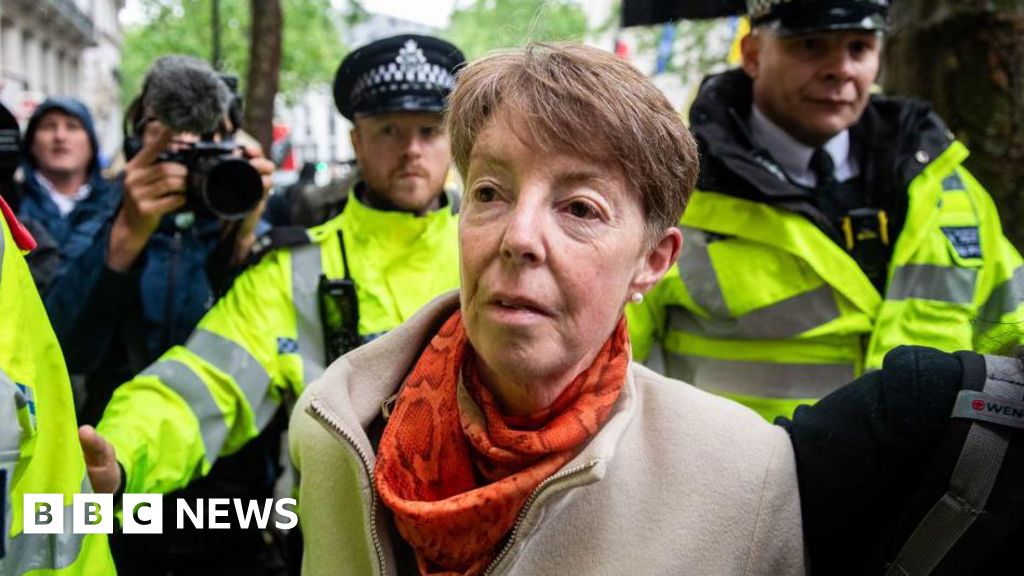ARTICLE AD BOX
By Angela Henshall
Business reporter, BBC News
Image source, GCHQ
Image caption,Vicky and Emily have more than three decades of experience between them in intelligence gathering
Disrupting terrorist plots has to be one of the most crucial jobs in the country, so it may surprise you to know this vitally important role at the top of the UK's signals and cyber intelligence agency is filled by not one person but two part-timers.
Vicky and Emily are GCHQ's deputy directors of counter-terrorism - one of the very first job shares in an operational intelligence position at such a senior level. They spoke to the BBC on condition of anonymity.
They use sophisticated analysis to support military operations and help the government respond to shifting geopolitics to reduce the terror threat at home. GCHQ works alongside MI5 and the Secret Intelligence Service on terrorism, cyber-attacks, serious crime and espionage.
The pair first met around a decade ago and bonded while posted to the US for some of their career. They made a decision to apply for the current job together as a promotion in May 2020, or not at all, just as the pandemic was taking hold.
"Vicky's baby was only a few weeks old so we were unsure, at first, if the timing worked for us," Emily says. "And, of course, she was sleep-deprived and exhausted from looking after a newborn and a toddler with minimal [Covid-dictated] support, so practically we knew it would be difficult," she adds.
"Vicky was a trooper and vividly remembers writing a CV at 3am in the morning after a night feed!"
Like many job shares this working pattern was then negotiated while one half of the pair was literally left holding the baby - babysitting the other's child during an assessment day for the role. Which could sound all too familiar.
Both working parents, they clock-up 28 hours a week each. Between them they have more than 30 years' experience in national security and intelligence gathering.
Mondays are "crossover day" and they use one email address "on both our classified and unclassified inboxes," which Vicky says means people never know which of the pair is responding.
They use Mondays to plan the week ahead in the office, and meeting up lets them keep across threats, discuss any issues that develop over the weekend, and take stock of counter terrorism strategy with people in Whitehall.
"It means we can discuss the full range of our top secret workload and we make sure we do this together in the office where we have access to classified systems," they say.
They also have meetings with the senior leadership team "where we take stock on changes from the terror threat, operational issues, partnering opportunities and risk," and they put aside time to discuss the welfare of their teams.
Tipping towards jobseekers
The fact this GCHQ job share exists at all reflects how radically the pandemic is flipping the job market in favour of some skilled professionals.
In 2021, there were 122,000 employees on job-sharing contracts in the UK, which was a slight increase on the 119,000 in 2020, according to official figures. The vast majority of job shares were by women working in education or health and social care roles.
But now, demand from workers for greater flexibility is high. Home working has increased from one in 20 workers pre-pandemic, to one in five today, and there have been a flurry of high profile co-chief executive appointments, in part in response to pandemic burnout.
However, half the UK public still think that top level part-time working is just not possible, and nearly the same proportion would not give a part-time colleague an "important or business critical task", according to a poll from consultancy, Timewise.
Yet there are eight million part-time workers, which account for around a quarter of the UK's working population. And among those, about 750,000 are now in senior roles with strategic responsibility, with a median salary of £47,0000, according to analysis in April from the Learning and Work Institute.
For the first time on record, there are as many posts vacant in the UK as there are unemployed people looking for a job, meaning the ball is very firmly in the UK jobseekers' court.
And they are often "pushing at an open door" according to Stephen Evans, chief executive at Learning and Work Institute. "Recruiters should proactively signal they are open to flexible working, and jobseekers shouldn't be afraid to ask," he says.
Image source, Timewise
Image caption,Zak Mensah and Sara Wajid share running one of the largest independent museum trusts in the country.
Not just for working mums
This isn't just about about working mothers either. There's a significant gap between the arrangements all workers have, versus what they want. Flexitime is used by just 21% of employees but 39% want this perk, according to a recent CIPD poll.
Another high-powered pair, Zak Mensah and Sara Wajid, are co-chief executives of Birmingham Museums Trust.
They each work three days a week running one of the largest independent museum trusts in the country spanning nine sites across the city.
Of the 45 institutions represented on the National Museums Council, it is the only organisation being led by people of colour.
Like Vicky and Emily, they too decided to apply for this high-pressure role as a team. Neither would have taken it on solo.
The pair say the fact they are from completely different backgrounds, skillsets and generations, makes them better at the whole job. "Just like visitors attending any of our sites," adds Mr Mensah, a dad of two young kids.
"2020 had made us both re-evaluate what is important in life" he adds. "There's a reason why two pilots sit in the cockpit!"
'Women are more likely to be stigmatised'
While there are clear benefits to job shares, Heejung Chung, a professor of sociology at University of Kent, sounds a note of caution because she says UK work culture still considers "those that 'show face' as productive and committed."
This means that not only do job sharers have a lot of overlap time for handovers but also work longer to be doubly sure that any stigmatised views are nixed, she says.
This is more likely when those sharers are mothers, or women. "When [mothers] work flexibly they are more likely to be stigmatised compared to, say, a heterosexual senior male doing a job share. People will think he is job sharing as he is doing another executive position, which is thought to have positive influence on job performance."
The reality is, however, that many job shares will work out better for bosses than workers - they get two brains for the price of one.
Professor Chung says that inevitably, people who do job shares "work harder and make sure they are more available than when there is one person working, to overcompensate."
But for Emily and Vicky at GCHQ the benefits come from bouncing ideas off their opposite number.
"Things get turned around quicker and the final hurdles on any issues are motored through with the additional momentum a job share brings," says Vicky.
But they are strict with work-home boundaries. "We do attend some events together - but we set a very high threshold on that. Non-working days are untouchable," Emily says. "We don't want to be advocates [for job sharing], if in reality it's not possible to achieve."

 2 years ago
34
2 years ago
34








 English (US)
English (US)